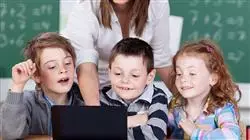University certificate
The world's largest faculty of education”
Introduction to the Program
You will approach complementary disciplines, such as Neurolinguistic Programming, Emotional Intelligence, Mindfulness or Neuroscience that will lead you to achieve your didactic objectives with greater efficiency"

This program stands out from the rest, not only because of the experience of its teachers and the quality of its content, but also because it covers all areas of Coaching in the academic world: from formal to non-formal education, taking into account the different evolutionary stages of the student. This will allow the teacher to acquire a series of invaluable competencies, which will accredit him/her as a coach at the educational level.
Its excellent teaching program integrates uncommon disciplines, such as Neurolinguistic Programming, Neuroscience, or Mindfulness, which are approached as perfectly complementary and compatible tools with a Coaching process at an individual and group level. In addition, it delves into the figure of the teacher and the family, as well as the psycho-evolutionary and educational characteristics of children and adolescents during their development, through the use of practical and didactic multimedia content. This will allow the future coach to quickly assimilate new tools and skills to apply in the daily practice of his or her profession.
Thanks to the participation of several educational psychologists in the development of the contents, this program offers a holistic vision of Coaching, with which to provide value to special groups. It will also provide teachers with the necessary skills to manage some of the main challenges of today's society, such as bullying or the impact of social networks on minors.
The program has been created by professional coaches, who, on a daily basis, work with children regarding key aspects such as identity, self-esteem, talent, creativity, emotional intelligence and attention, maintaining a systemic vision with the family and the educational center.
You will have practical tools of high applicability in different contexts"
This Professional master’s degree in Educational Coaching, contains the most complete and up-to-date program on the market. The most important features include:
- Development of real cases presented by experts in Educational Coaching
- Graphic, schema and practical contents that gather information on those disciplines that are essential for professional practice
- News on Coaching strategies
- Practical exercises where the self-evaluation process can be carried out to improve learning
- Study of complementary disciplines and diversity of fields such as social exclusion, formal and non-formal education, nutrition, sports, music, family, arts, as well as teaching cloisters
- The latest technology in online teaching software
- State-of-the-art interactive video systems
- Continuous updating and recycling systems
- Autonomous learning: full compatibility with other occupations
- Educational synergy support groups: questions to the expert, discussion and knowledge forums
- Availability of content from any device, fixed or portable, with an Internet connection
- Supplementary documentation banks available even after the program has been completed
You will learn through real cases studies presented by coaching experts"
Its teaching staff is made up of prestigious and recognized professionals with a long teaching career. The methodological design of this program, developed by a multidisciplinary team of experts in e-learning, integrates the latest advances in educational technology for the creation of numerous multimedia tools that allow the professional to face the solution of real situations in their daily practice. These will enable you to advance by both acquiring knowledge and developing new skills in your future professional work.
The contents generated for this program, as well as the videos, self-tests, real cases and modular exams, have been thoroughly reviewed, updated and integrated by the professors and the team of experts that make up the working group, to facilitate, in a didactic and staggered manner, a learning process that allows the objectives of the teaching program to be achieved.
This program uses the latest advances in educational technology, based on e-learning methodology"

You will have multimedia tools meticulously designed by coaches, which will favor the speed of assimilation and learning"
Why study at TECH?
TECH is the world’s largest online university. With an impressive catalog of more than 14,000 university programs available in 11 languages, it is positioned as a leader in employability, with a 99% job placement rate. In addition, it relies on an enormous faculty of more than 6,000 professors of the highest international renown.

Study at the world's largest online university and guarantee your professional success. The future starts at TECH”
The world’s best online university according to FORBES
The prestigious Forbes magazine, specialized in business and finance, has highlighted TECH as “the world's best online university” This is what they have recently stated in an article in their digital edition in which they echo the success story of this institution, “thanks to the academic offer it provides, the selection of its teaching staff, and an innovative learning method aimed at educating the professionals of the future”
A revolutionary study method, a cutting-edge faculty and a practical focus: the key to TECH's success.
The most complete study plans on the university scene
TECH offers the most complete study plans on the university scene, with syllabuses that cover fundamental concepts and, at the same time, the main scientific advances in their specific scientific areas. In addition, these programs are continuously being updated to guarantee students the academic vanguard and the most in-demand professional skills. In this way, the university's qualifications provide its graduates with a significant advantage to propel their careers to success.
TECH offers the most comprehensive and intensive study plans on the current university scene.
A world-class teaching staff
TECH's teaching staff is made up of more than 6,000 professors with the highest international recognition. Professors, researchers and top executives of multinational companies, including Isaiah Covington, performance coach of the Boston Celtics; Magda Romanska, principal investigator at Harvard MetaLAB; Ignacio Wistumba, chairman of the department of translational molecular pathology at MD Anderson Cancer Center; and D.W. Pine, creative director of TIME magazine, among others.
Internationally renowned experts, specialized in different branches of Health, Technology, Communication and Business, form part of the TECH faculty.
A unique learning method
TECH is the first university to use Relearning in all its programs. It is the best online learning methodology, accredited with international teaching quality certifications, provided by prestigious educational agencies. In addition, this disruptive educational model is complemented with the “Case Method”, thereby setting up a unique online teaching strategy. Innovative teaching resources are also implemented, including detailed videos, infographics and interactive summaries.
TECH combines Relearning and the Case Method in all its university programs to guarantee excellent theoretical and practical learning, studying whenever and wherever you want.
The world's largest online university
TECH is the world’s largest online university. We are the largest educational institution, with the best and widest online educational catalog, one hundred percent online and covering the vast majority of areas of knowledge. We offer a large selection of our own degrees and accredited online undergraduate and postgraduate degrees. In total, more than 14,000 university degrees, in eleven different languages, make us the largest educational largest in the world.
TECH has the world's most extensive catalog of academic and official programs, available in more than 11 languages.
Google Premier Partner
The American technology giant has awarded TECH the Google Google Premier Partner badge. This award, which is only available to 3% of the world's companies, highlights the efficient, flexible and tailored experience that this university provides to students. The recognition as a Google Premier Partner not only accredits the maximum rigor, performance and investment in TECH's digital infrastructures, but also places this university as one of the world's leading technology companies.
Google has positioned TECH in the top 3% of the world's most important technology companies by awarding it its Google Premier Partner badge.
The official online university of the NBA
TECH is the official online university of the NBA. Thanks to our agreement with the biggest league in basketball, we offer our students exclusive university programs, as well as a wide variety of educational resources focused on the business of the league and other areas of the sports industry. Each program is made up of a uniquely designed syllabus and features exceptional guest hosts: professionals with a distinguished sports background who will offer their expertise on the most relevant topics.
TECH has been selected by the NBA, the world's top basketball league, as its official online university.
The top-rated university by its students
Students have positioned TECH as the world's top-rated university on the main review websites, with a highest rating of 4.9 out of 5, obtained from more than 1,000 reviews. These results consolidate TECH as the benchmark university institution at an international level, reflecting the excellence and positive impact of its educational model.” reflecting the excellence and positive impact of its educational model.”
TECH is the world’s top-rated university by its students.
Leaders in employability
TECH has managed to become the leading university in employability. 99% of its students obtain jobs in the academic field they have studied, within one year of completing any of the university's programs. A similar number achieve immediate career enhancement. All this thanks to a study methodology that bases its effectiveness on the acquisition of practical skills, which are absolutely necessary for professional development.
99% of TECH graduates find a job within a year of completing their studies.
Professional Master's Degree in Educational Coaching
Training teachers through our program in Educational Coaching has not only a personal but also a social impact. Teachers graduated from TECH Global University, in this sense, will understand that education means giving themselves to students in order to facilitate their growth and fulfillment, offering them what makes us unrepeatable and configures us as unique and complete people. In this way, our educators generate a transformative effect that impacts students (their personal lives and their environment), professional groups and, therefore, societies.
The best Professional Master's Degree in Educational Coaching
The TECH School of Education, through its postgraduate degree in Educational Coaching, prepares professionals to assume responsibilities in the direction and management of educational centers. Consequently, our graduate studies train teachers in managerial qualities such as teamwork, leadership, communication and innovation. We also address conflict resolution in the classroom such as, for example, the detection of students who present characteristics compatible with behavioral and/or family difficulties and may require a professional mediation environment.







